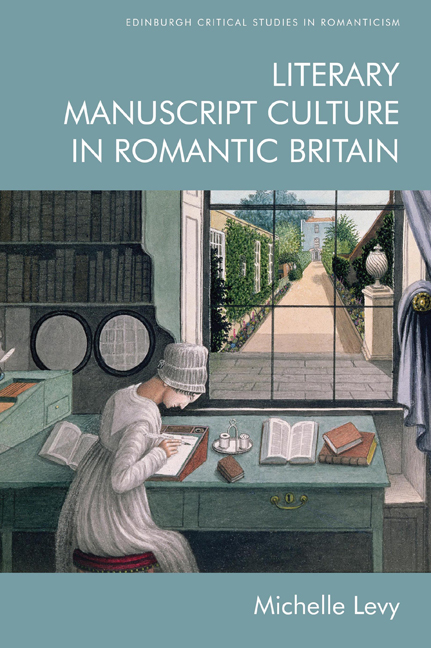Book contents
- Frontmatter
- Contents
- List of Illustrations
- Acknowledgements
- Dedication
- Introduction
- 1 Intentionality and the Romantic Literary Manuscript
- 2 Literary Reviews and the Reception of Manuscript Culture
- 3 Anna Barbauld’s Poetic Career in Script and Print
- 4 Lord Byron, Manuscript Poet
- 5 Jane Austen’s Fiction in Manuscript
- 6 Script’s Afterlives
- Afterword: Blake’s Digitised Printed Script
- References
- Index
- Plate Section
6 - Script’s Afterlives
Published online by Cambridge University Press: 08 October 2020
- Frontmatter
- Contents
- List of Illustrations
- Acknowledgements
- Dedication
- Introduction
- 1 Intentionality and the Romantic Literary Manuscript
- 2 Literary Reviews and the Reception of Manuscript Culture
- 3 Anna Barbauld’s Poetic Career in Script and Print
- 4 Lord Byron, Manuscript Poet
- 5 Jane Austen’s Fiction in Manuscript
- 6 Script’s Afterlives
- Afterword: Blake’s Digitised Printed Script
- References
- Index
- Plate Section
Summary
The case studies explored in the previous three chapters have fleshed out the material and social processes that manuscripts witness: practices of composition, revision, sharing, reading, copying, embellishment and preservation. From the moment of their creation, manuscripts almost always pass from hand to hand, as they are written and altered, read and recited, memorised and copied, often by multiple individuals, sometimes over generations. As we have seen, literary manuscripts pass through many hands for a variety of purposes and over time they can acquire new significations. Manuscripts can serve as working papers, subject to revision and correction before being preserved, shared or circulated more widely; when shown to literary advisers and publishers, they can be scrutinised for their literary merit and subject to editorial intervention or commentary; when shared with friends, family and others, they can act as sources of pleasure and entertainment; they can be used as copy for printers to set type; when gifted or inherited, they can serve as mementoes of cherished authors and loved ones; when bought or sold, they can be collected for reasons of profit and prestige by collectors and libraries; when studied by scholars, they can establish the textual history of a work. This chapter focuses on how Romantic literary manuscripts have been conceptualised after their working lives as documents to be shared, revised or printed, is, as it were, over; that is, this chapter turns to the literary manuscript when it has acquired the status of an artefact.
It is appropriate to attempt to discern the cultural understandings of Romantic literary manuscripts, insofar as, according to Dana Gioia, ‘the [Romantic] era … fostered an unprecedented reverence for literary manuscripts. Earlier ages had viewed a poet's holograph in purely functional terms.’ For Gioia, ‘[t]his shift in sensibility could probably only have occurred in the nineteenth century at the height of print culture’, as
[t]he uniformity of machine-printed books slowly imbued the handwritten page with a unique personal aura. As mechanical typography visually standardized written language, the reader was less likely to view an autograph copy of a poem purely as a piece of verbal communication; it now became a unique artifact that invited a different sort of attention … The omnipresence of mechanical printmade the manuscript's medium its most important message.
- Type
- Chapter
- Information
- Literary Manuscript Culture in Romantic Britain , pp. 214 - 258Publisher: Edinburgh University PressPrint publication year: 2020



